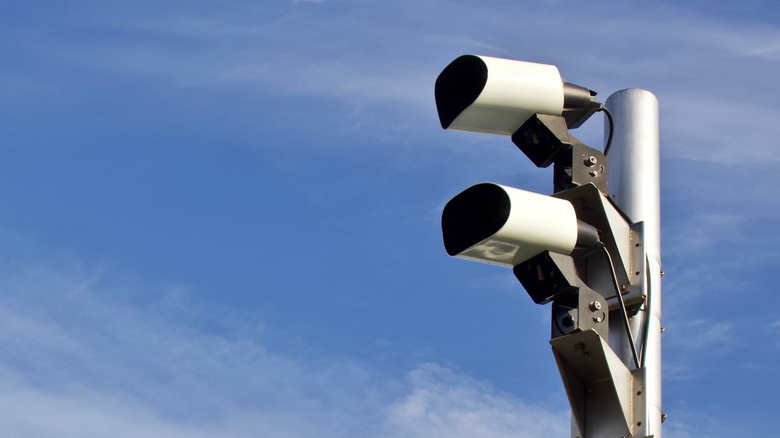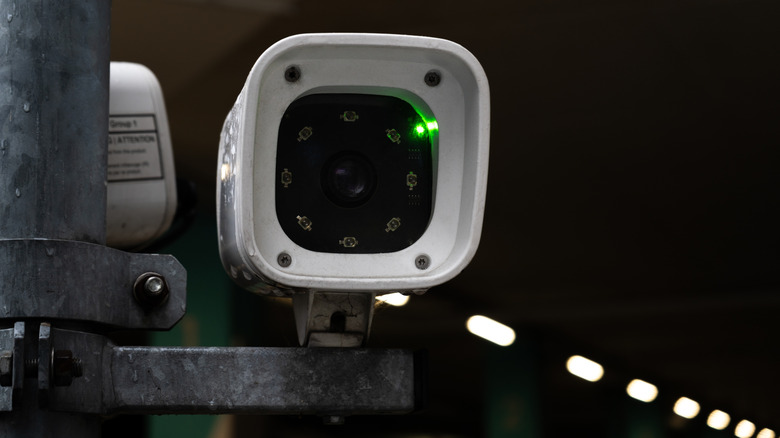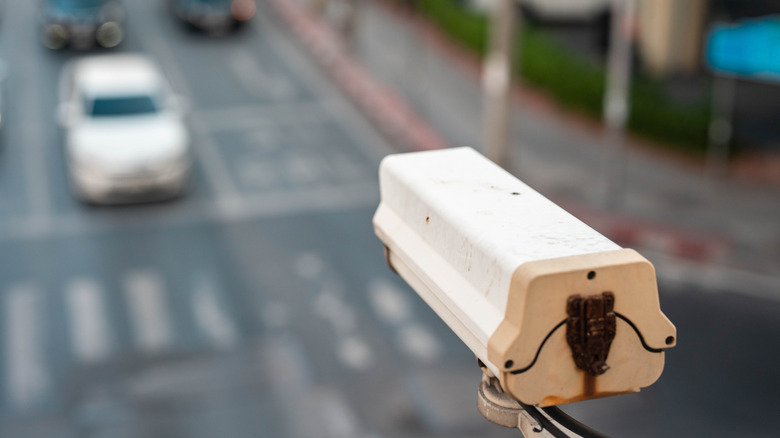Creepy Virginia Police Cameras Tracked One Driver 526 Times In 4 Months
If you commute across the United States, you might've seen little cameras above traffic lights. They're possibly automatic license plate readers (ALPR), a system of cameras and software that constructs records of vehicle activity. According to the U.S. Department of Homeland Security, this technology has been used by law enforcement for over two decades. However, recent technological advancements — including the use of machine learning and artificial intelligence (AI) – can change how these systems operate.
Lee Schmidt and Crystal Arrington, a pair local to the Norfolk, Virginia area, also noticed these ALPR cameras on their regular driving routes. Wondering what the device was, Schmidt snapped a picture of one while at a stoplight and reached out to the local council to ask. The council replied, confirming that the cameras were a part of a Flock Safety camera system. Flock is an AI startup and the largest provider of ALPR systems throughout the United States. The company specializes in surveillance equipment, including body cameras and Drones as First Responders (DFR).
Flock holds a $2.2 million deal with the city of Norfolk for their ALPR camera system, which is just one of over 5,000 local police departments in the United States using Flock's ALPRs. In 2023, more than 170 cameras were installed across Norfolk, continuously monitoring and tracking vehicles as they pass by. The Norfolk Chief of Police stated that it would be difficult to drive any distance across the city without encountering one of these cameras. As a result, the Institute for Justice, a non-profit public interest law firm, argues that this system could be a violation of the Fourth Amendment.
A court case emerged surrounding the Virginia police camera system
The Institute for Justice argues that the Fourth Amendment sets out to prevent the United States government from becoming a surveillance state, but that the Virginia police camera system is to surveil residents' movements. Usually, traffic cameras would be triggered by the suspicion of a traffic law violation, but these ALPRs register every plate they detect to a database. No warrant or probable cause is used to justify this monitoring.
It isn't only the plates themselves that the ALPRs appear to be running. The system uses AI to grab other data about your car, like the color, make, and any decals. From there, it can build a profile, or a 'Vehicle Fingerprint Technology'. And, with the cameras covering so much of Norfolk, the system creates a traceable path as vehicles pass from one to another. When triangulated together, that's a lot of data — which partnering police departments can then access without a warrant.
Concerned about the expansion of this technology, Schmidt and Arrington, as represented by the Institute for Justice, sued to find out more about how it was being implemented across Norfolk. According to the court records, 176 cameras across Norfolk logged Schmidt's activity 526 times from February to July. Arrington was logged even more frequently, with 849 logs during the same duration. A third, unnamed plaintiff, was logged more than 14 times over a period of six-and-a-half hours. This case marks the start of The Plate Privacy Project; an Institute for Justice project set out to safeguard against mass surveillance.
Why could the Virginia police camera system be a problem?
The Institute for Justice and the plaintiffs' concerns around this type of tracking are two-fold. Firstly, it could arguably be unconstitutional to be monitored in such a way without a warrant or justifiable cause. Secondly, if it isn't regulated and audited properly, then the data could be abused, exploited, or leaked. It could even be sold illegally.
As the ALPR cameras capture cars every time they drive by, paired with the large volume of them in use across the country, a massive amount of data could be stored in these databases. This data could be used to extrapolate where their drivers are headed, who they're meeting up with, and even create maps of their whereabouts. That's a lot of data that could potentially be misused, which goes beyond what would normally be seen when running license plates.
Such a large volume of personal data could easily be abused, and there have been public instances of such. In 2024, the Sedgwick, Kansas police chief admitted to using a license plate system to monitor the location of his ex-partner and her new boyfriend. This occurred 228 times over a more than four-month period, during which he also followed the pair in his police vehicle, sometimes confronting them. Similarly, a lieutenant in the same county faced 18 months of probation after stalking his estranged wife using Wichita police's camera system. In both of these cases, they were using Flock systems.


